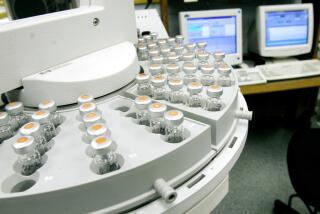Advice about whether, how to arrange an autopsy
- Share via
Autopsy decisions are usually made at a time when family members are already feeling vulnerable and overwhelmed. Here are some tips to help you decide whether to seek an autopsy and what to expect if you decide to go ahead.
--
Will an autopsy be useful?
An autopsy will generally provide additional information about the cause of death, and it may also turn up previously unknown information about the deceased’s health issues. It’s not unusual for an autopsy to uncover previously unrecognized medical conditions, and in some cases, if the disease has a genetic basis, these may have implications for survivors. If Alzheimer’s disease is suspected, an autopsy is the only means to provide a definitive diagnosis and a final answer about what caused the person’s dementia.
Ultimately, the decision is a personal one that only you can make.
--
Who do you ask?
Start with the deceased person’s doctor. If the doctor resists the idea, don’t give up. The decision is yours, not the physician’s. If the doctor is uncooperative, contact the coroner’s office for help arranging the autopsy. The Los Angeles County coroner’s office, for example, can be reached at (323) 343-0512; check the phone book for others.
--
Who will perform the autopsy?
If the person died in a hospital, you might be able to have the autopsy done there. Medical schools are another place to turn, and they sometimes offer lower rates than private pathologists. If those options aren’t available, ask your doctor, the funeral home or the local coroner for a referral. The College of American Pathologists ( www.cap.org) maintains a list of board-certified pathologists who perform autopsies on a fee-for-service basis.
If your loved one suffered from dementia, the Alzheimer’s Assn. in Los Angeles, www.alz.org/californiasouth land) can help you find a research facility or hospital that will conduct a brain autopsy. Some autopsy providers are also listed in the phone book.
--
What does an autopsy involve?
An autopsy begins with an examination of the body to look for outward signs of illness or trauma, such as bruises or abrasions. Next, the pathologist makes an incision in the chest cavity to access the heart, lungs and other organs. Each organ is examined for signs of disease and weighed to help quantify any atrophy or abnormal growth that’s present. Another incision is made behind the ears to permit an examination of the brain. After examination, organs are returned to the body.
Where appropriate, small slices of tissue are taken and examined under a microscope to look for clues about disease, such as tumor cells. In some cases, tissue samples may be taken to use for toxicology tests, for instance to look for signs of drug toxicity.
Once the autopsy is complete, the incisions are sewn closed in a manner that renders them nearly invisible afterward. An autopsy will not be evident; a normal viewing is possible in all cases.
--
How do I know my loved one will be in good hands?
Ask questions before you commit.
To make sure the pathologist is experienced, find out how many autopsies he or she has performed (you want someone who has performed more than just a few dozen).
Qualifications are important too: Make sure the pathologist is certified in anatomic or forensic pathology by the American Board of Pathology. “There are other organizations out there that will give you a certification for a few hundred dollars,” says Dr. Harry Bonnell, a fellow of the American Society for Clinical Pathology and a pathologist in private practice in San Diego. Such certificates won’t likely ensure the skills needed to perform a thorough autopsy, he says.
Make sure the pathologist, not a technician, will perform the autopsy. “An autopsy technician may be able to do the manual work, but they don’t have the training to interpret anything,” Bonnell says. Some autopsy services, such as 1-800-AUTOPSY, also work with companies that procure and distribute tissue donations. Tissues cannot be taken without written permission, so make sure you’ve spelled out in writing whether you wish to donate your loved one’s tissues.
--
How much will it cost?
If the death occurred in a teaching hospital, the hospital will almost always perform the autopsy without a fee, says Dr. Kaveh Shojania, a physician at the University of Ottawa. Other hospitals and private pathologists usually charge $2,000 to $3,500, or more if complicated procedures are required, such as toxicology tests that might be used to look for a drug overdose or the presence of drugs that could cause toxic interactions. Expect to shoulder this cost yourself, because an autopsy is not covered by insurance or Medicare. If the coroner requires it, then the coroner’s office will pay.
--
What information should you expect in the report?
The report will list details about the cause of death and evidence of disease and disease progression. Ask in advance what types of tests and examinations will be done. A standard autopsy covers all major organs, but additional exams or tests may be done to confirm certain conditions, such as Alzheimer’s disease, which requires a time-consuming examination of the brain. The more complete the autopsy, the more complete the information it will provide. But you always have the option to limit the autopsy to only certain organs or tissues. For instance, you may choose a brain-only autopsy if you’re looking strictly for Alzheimer’s.
--
How long will it take?
The norm for a standard autopsy is about two to three weeks, but if toxicology tests or specialized studies are required it might take as long as two months, Bonnell says.
--
What information does the pathologist need?
Except in cases where an autopsy is required by a coroner, the next of kin must grant permission for the autopsy.
Explain what you hope to learn from the autopsy, and give the pathologist information about the deceased’s medical history to ensure that he or she knows what to look for, such as medical devices that might have failed or any previous medical procedures such as surgery.
--
Consider making prior arrangements.
In some cases, it might make sense to arrange for the autopsy ahead of time. Dr. Michael Dobersen, the coroner/medical examiner for Arapahoe County, Colo., and a member of the College of American Pathologists’ Autopsy Committee, says that in the last year, he’s had two people contact him in advance to prearrange an autopsy for a parent with dementia. They signed the permission forms and agreed on payment ahead of time, so when the parent died the bereaved children did not have to worry about these details.
If your loved one has dementia, you might consider contacting a research institute that studies the disease, such as the Alzheimer’s Disease Research Program at USC, at (213) 740-7777; or the Alzheimer Disease Center at UCLA, (310) 794-3665 If the patient enrolls in the research program while still alive, a brain autopsy will likely be performed at no cost to you.
Making prior arrangements can save you the difficulty of having to think about this in the midst of your grief and can give you more time to shop around and find a pathologist you feel comfortable with. “You sign an autopsy permit, and then you have everything signed and worked out,” Dobersen says. “That does make things easy when the time comes.”
--






